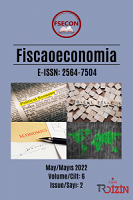Kamusal Birer Mal ve Hizmet Olarak Savunma ve Sağlık Harcamalarının Gelir Dağılımı Üzerindeki Etkileri: Seçilmiş Avrupa Birliği Ülkeleri Üzerine Bir Analiz
The Effects of Military and Health Expenditures as Public Goods and Services on Distribution of Income: An Analysis on Selected European Union Countries
Author(s): Ahmet Emre Biber, S. Çağrı EsenerSubject(s): Economic history, Health and medicine and law, Economic development, Transformation Period (1990 - 2010), Present Times (2010 - today), Public Finances
Published by: Ahmet Arif Eren
Keywords: Military Expenditure; Health Expenditure; Income Distribution; Bootstrap Panel Granger Causality; Panel Data Analysis;
Summary/Abstract: Distribution and redistribution policies in the public economy are important devices used to prevent inequality in income distribution in that specific country. As it is well known, the economic growth of countries does not mean the whole thing by itself. In addition to economic growth, ensuring equality in income distribution, which is an indicator of how national income is distributed among households, is also an important macroeconomic indicator. In this context, in this study, the long-term and causality relationship between military and health expenditures with income distribution for the period 2001-2018 of 13 selected European Union member countries has been tried to be examined. In the two-way causality analyses using the Bootstrap panel Granger causality methodology, it is striking that there is a direct interaction from all three variables to each other for most of the sample countries. According to the main findings of the study, it has been determined that serious policy differences persist due to the lack of sufficient common implementation or harmonization in fiscal policy, contrary to the monetary policy in EU countries. In particular, some countries try to maintain public services with almost a concession from income distribution; however, the fact that the situation is completely ‘vice versa’ for some countries is another remarkable result of the study. Again, in the conclusion part of the study, besides the general evaluation, some basic problem-solving suggestions are also presented to help the policymakers to improve the distribution of income in the future.
Journal: Fiscaoeconomia
- Issue Year: 6/2022
- Issue No: 2
- Page Range: 402-438
- Page Count: 37
- Language: Turkish

